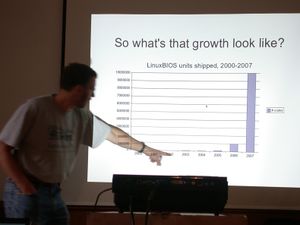Welcome to coreboot: Difference between revisions
Jump to navigation
Jump to search
m (FPGA in Opteron socket.) |
m (Don't scare people with clusters right away ;)) |
||
| Line 29: | Line 29: | ||
<small>LinuxBIOS can be (and is) deployed in a wide range of scenarios.</small> | <small>LinuxBIOS can be (and is) deployed in a wide range of scenarios.</small> | ||
<hr /> | <hr /> | ||
* Standard desktop computers | |||
* [[Clusters]], high-performance computing | * [[Clusters]], high-performance computing | ||
* Embedded solutions, appliances, terminals | * Embedded solutions, appliances, terminals | ||
* [http://en.wikipedia.org/wiki/Small_form_factor Small form factor computers], [http://en.wikipedia.org/wiki/Home_theater_PC Home-theater PCs] (HTPC) | * [http://en.wikipedia.org/wiki/Small_form_factor Small form factor computers], [http://en.wikipedia.org/wiki/Home_theater_PC Home-theater PCs] (HTPC) | ||
* Servers (serial console, remote flashing, fast boot times) | * Servers (serial console, remote flashing, fast boot times) | ||
Revision as of 00:12, 18 October 2006
|
LinuxBIOS is a Free Software project aimed at replacing the proprietary BIOS you can find in most of today's computers. It performs just a little bit of hardware initialization and then executes one of many possible payloads, e.g. a Linux kernel, FILO, OpenBIOS, Etherboot, ADLO (for booting Windows 2000 and OpenBSD), Plan 9, memtest86 and many more.
Quick Links
|

News
|





